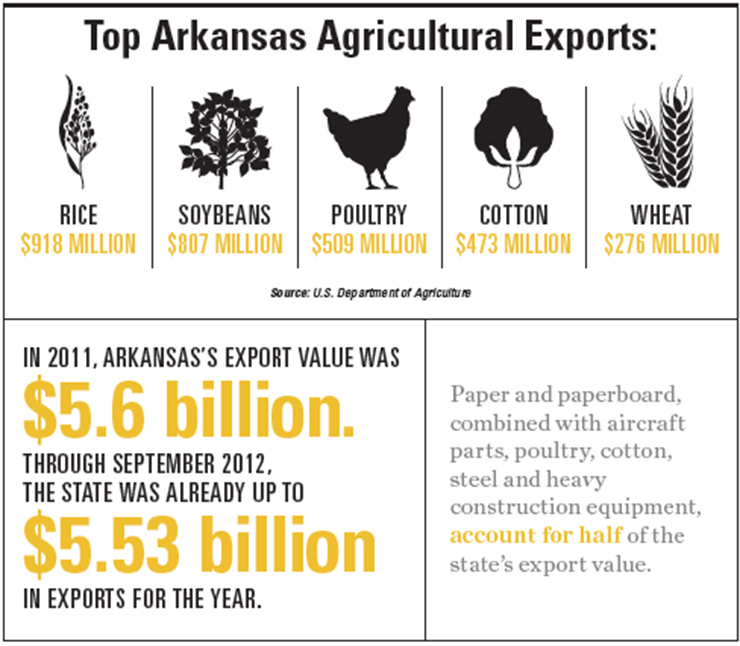Home > Arkansas > Arkansas Farm to Table > Going Global: Company Success Illustrates Importance of Ag Exports
Going Global: Company Success Illustrates Importance of Ag Exports

Bruce Oakley started selling bulk fertilizer from his small cattle farm in El Paso, Ark., after getting frustrated that he could only buy it in 50-pound bags.
The company he started in 1968 now serves as an example of Arkansas’s international export industry – an important factor in the state’s economy. The dry bulk commodity and sales company uses a mix of barges, trucks and trains to move a variety of products such as fertilizer and grain overseas.
Over the past decade, Bruce Oakley Inc. started looking at South America for expansion, says David Choate, vice president of grains and barges.
“It’s still a fairly small portion of the business, but we’re continuing to grow that. It’s slow but steady growth,” he says. “At this point it’s only fertilizer, but I do see expanding to grain sales.”
Exports Expand Business
In the past few years, the state’s exports of paper and paperboard have increased, says Zach Taylor, director of marketing for the Arkansas Agriculture Department. These products, combined with aircraft parts, poultry, cotton, steel and heavy construction equipment, account for half of the state’s export value. The top agricultural exports include rice, soybeans, poultry, cotton and wheat.
The state is on track to surpass the 2011 export value of more than $5.5 billion.
The growth in exports has helped the state weather the economic downturn, Taylor says.
“It has also taken up the slack in the domestic market for Arkansas goods created by the recession,” he says.
His point is reflected in the growth of Bruce Oakley Inc. Now run by Oakley’s son, Dennis, the company continues to expand its grain-handling capacity. It employs about 500 people and an additional 540 contractors, including truck drivers and tugboat captains. The majority of the employees live in Arkansas, but some also work at locations in Louisiana, Mississippi and Missouri.
“We’re going against the trend,” Choate says. “We’ve been in a hiring mode since 1968.”
Location and personnel have allowed the company to grow to what it is today, he says.

As Bruce Oakley gained more business, he moved the company closer to railroad tracks and then to the Arkansas River when it became navigable. Now headquartered in North Little Rock, the company has access to ship grains and fertilizer by boat, train or truck from the same location.
Oakley Trucking, another side of the company, operates more than 260 end dumps and more than 180 pneumatic tanks.
The trucking segment connects with ports located on the Arkansas River at Morrilton, Dardanelle, Pendleton and North Little Rock, in addition to ports in Caruthersville, Mo., on the Mississippi River and Shreveport, La., on the Red River.
The Port of Morrilton shows how the company blends transportation routes. Accessible from Interstate 40, the site can store 500,000 bushels of grain purchased from local farmers that is then put on a barge for New Orleans.
“We try to tie it all together,” Choate says.
But location hasn’t been the only factor driving success. Choate says the employees work to make that happen while keeping the principles and ideas of Bruce Oakley himself alive within the company, even after his passing in 2006.
“The whole key to our success goes back to our founder and the vision and regard he had for his employees along with the things he taught us about business, honesty and hard work,” Choate says. “It’s kind of cliché, but the truth is he was a remarkable man.”



